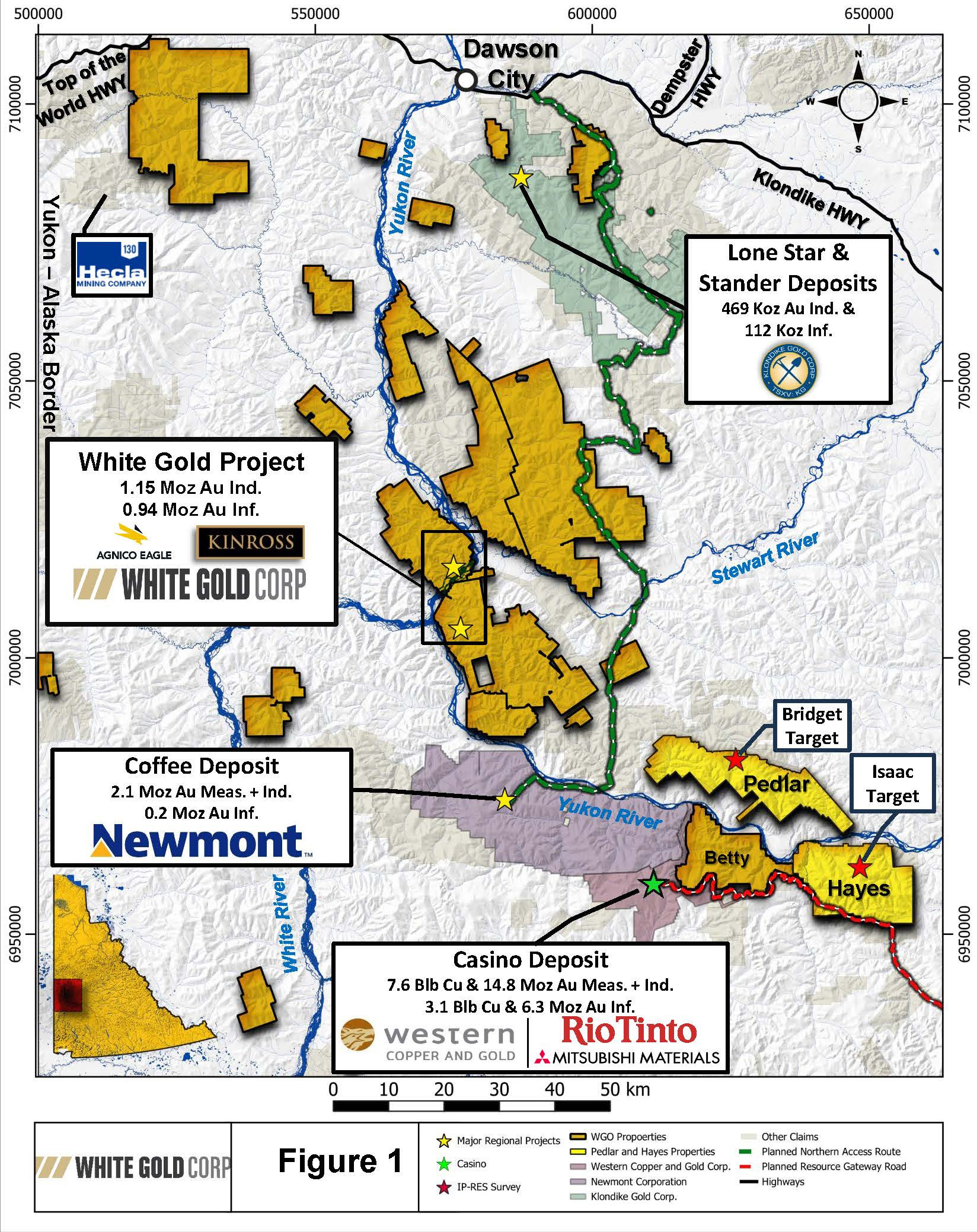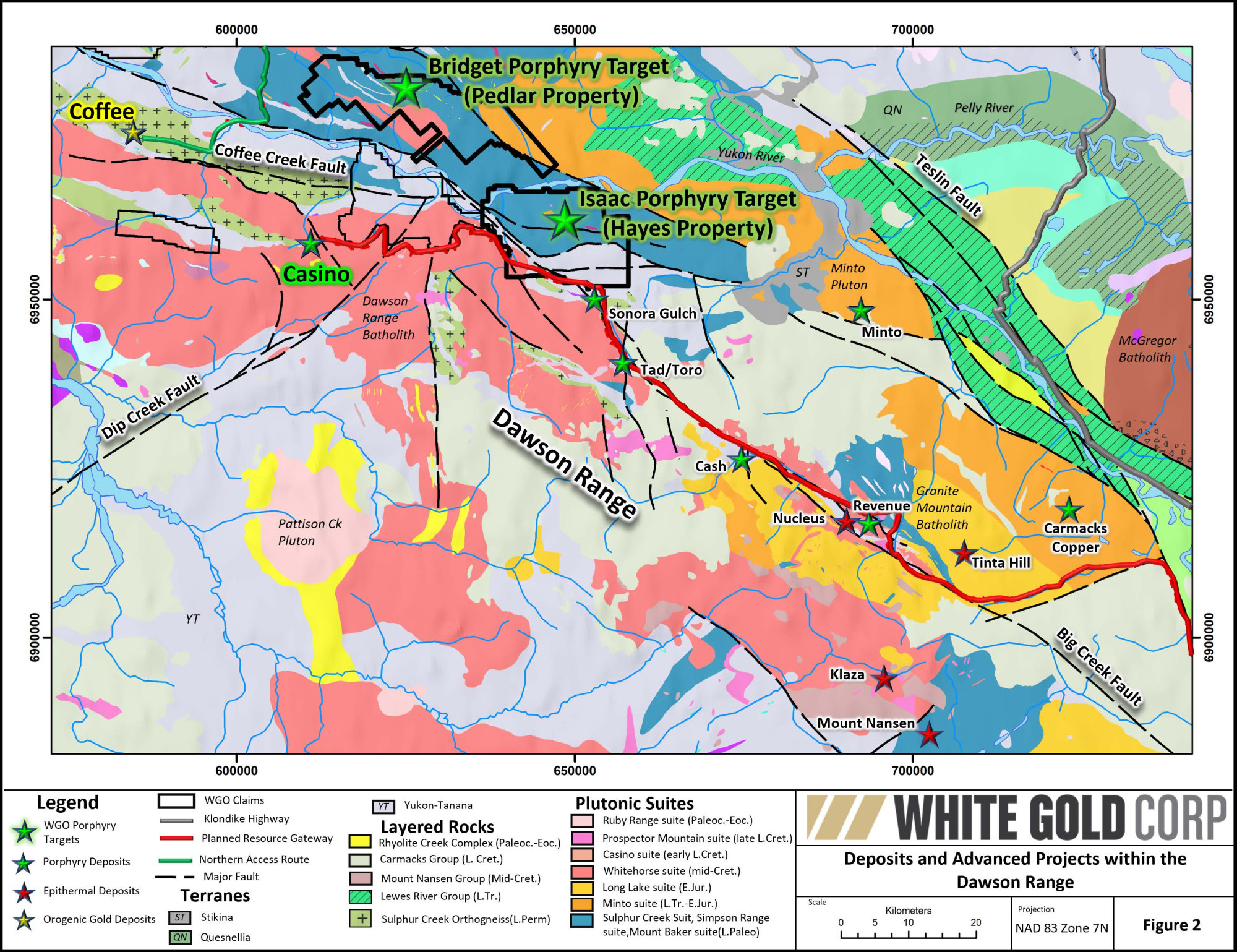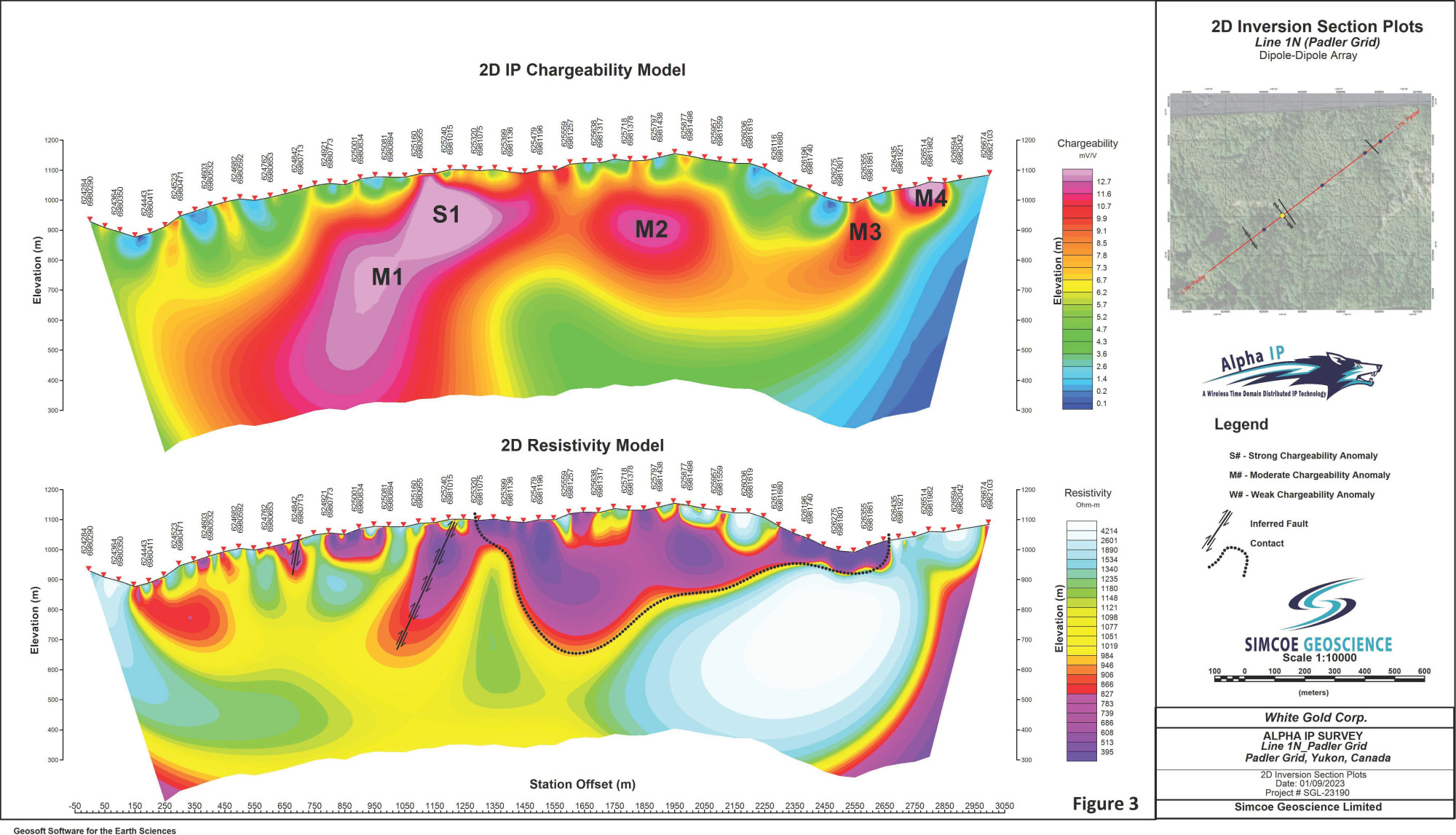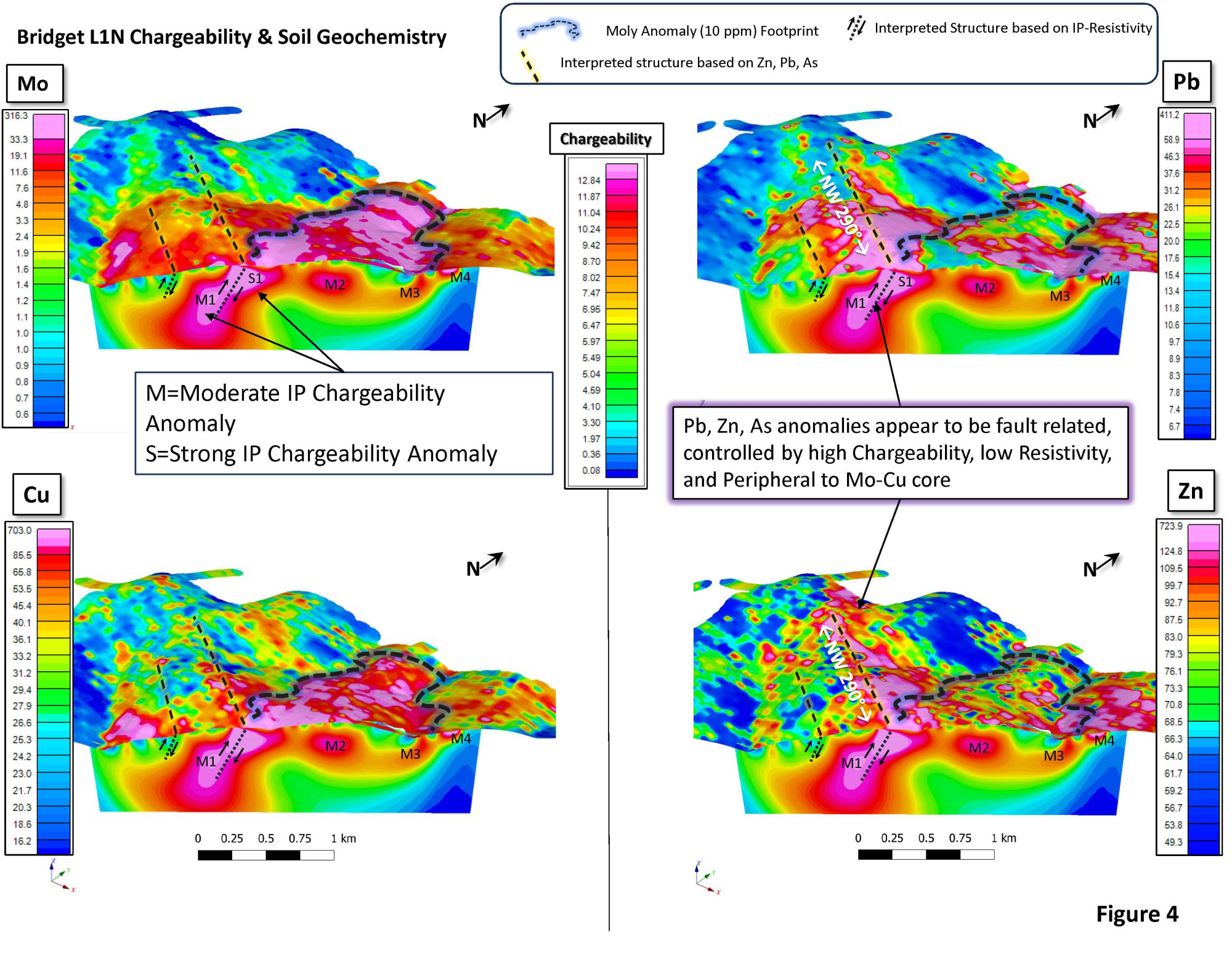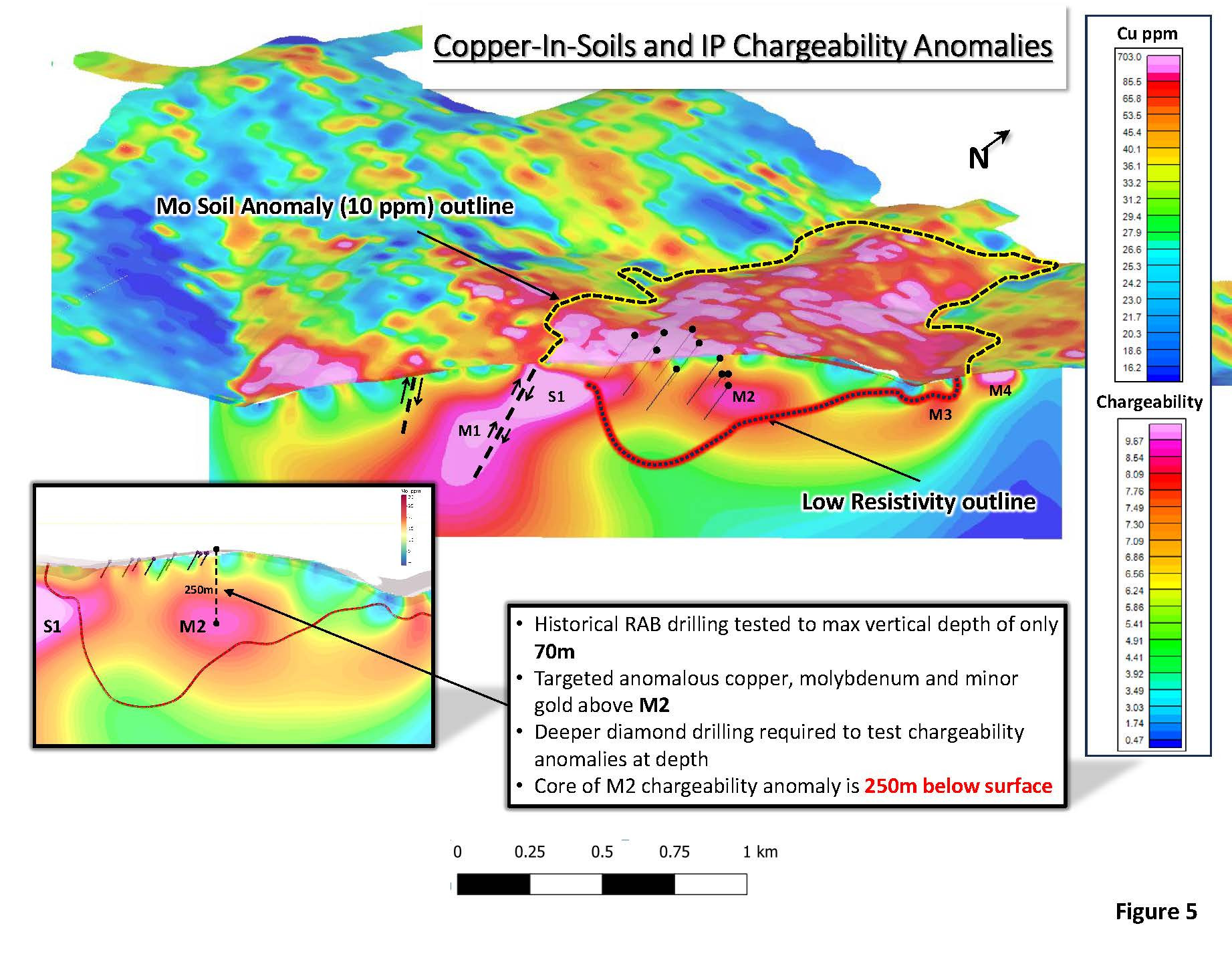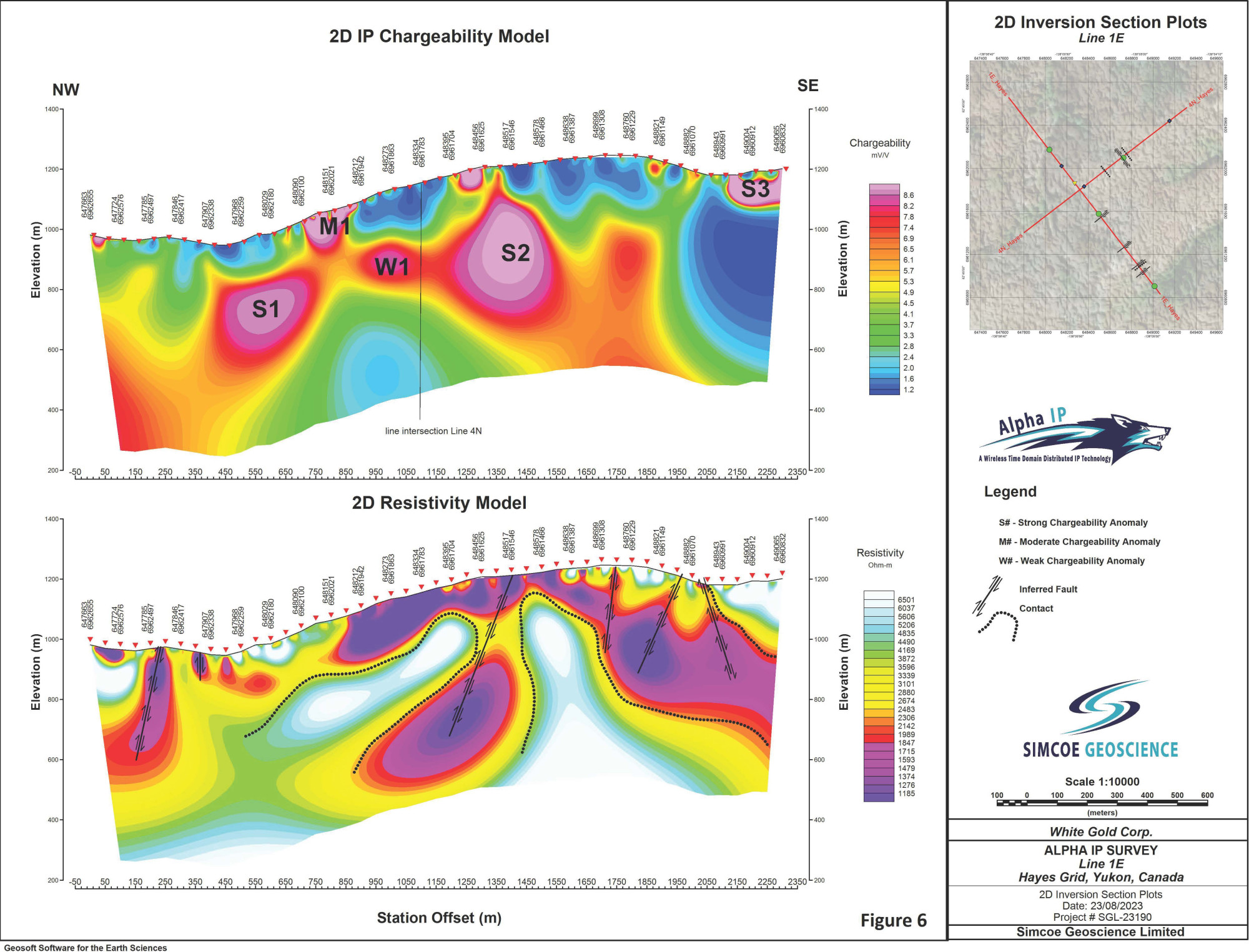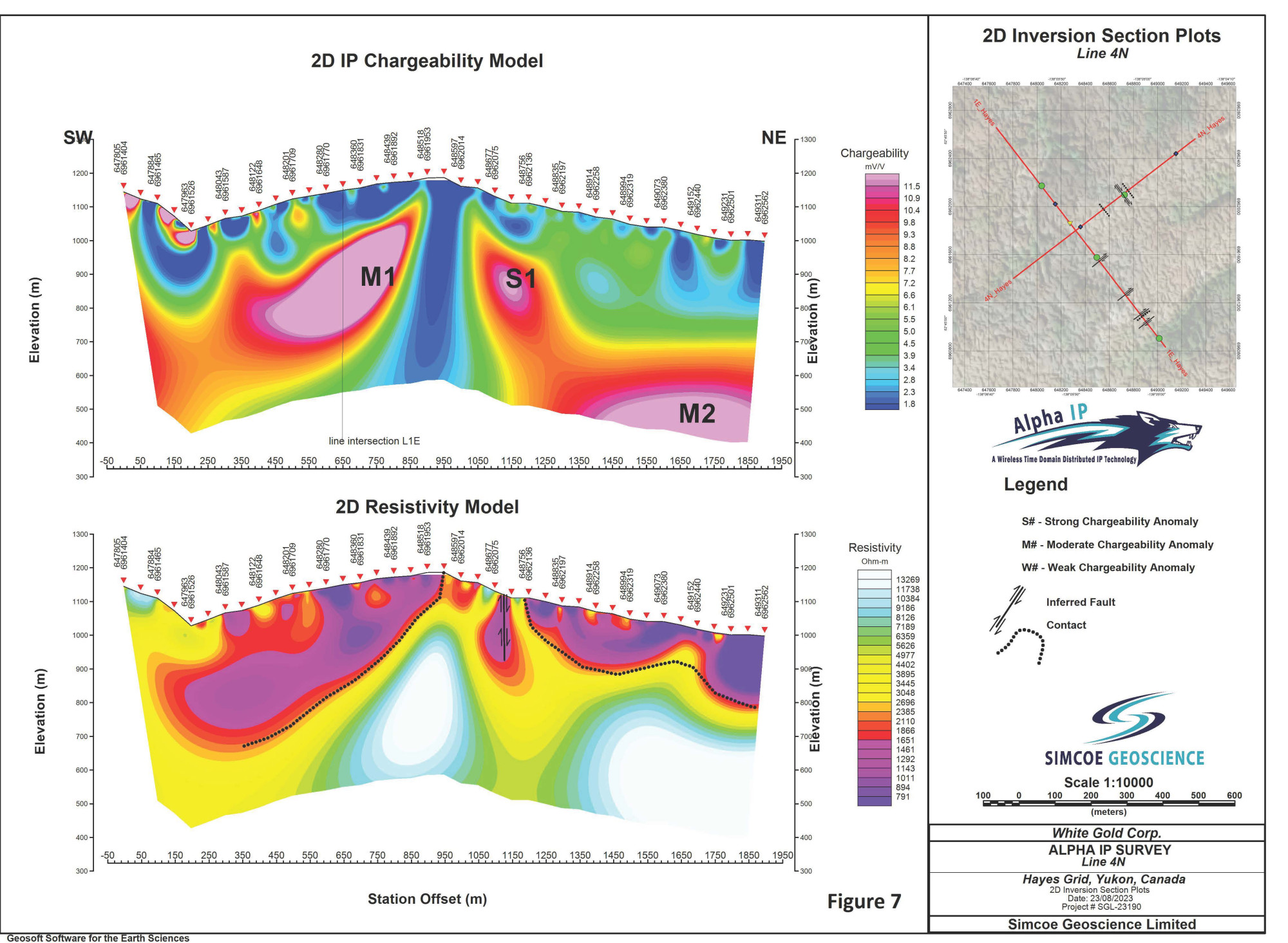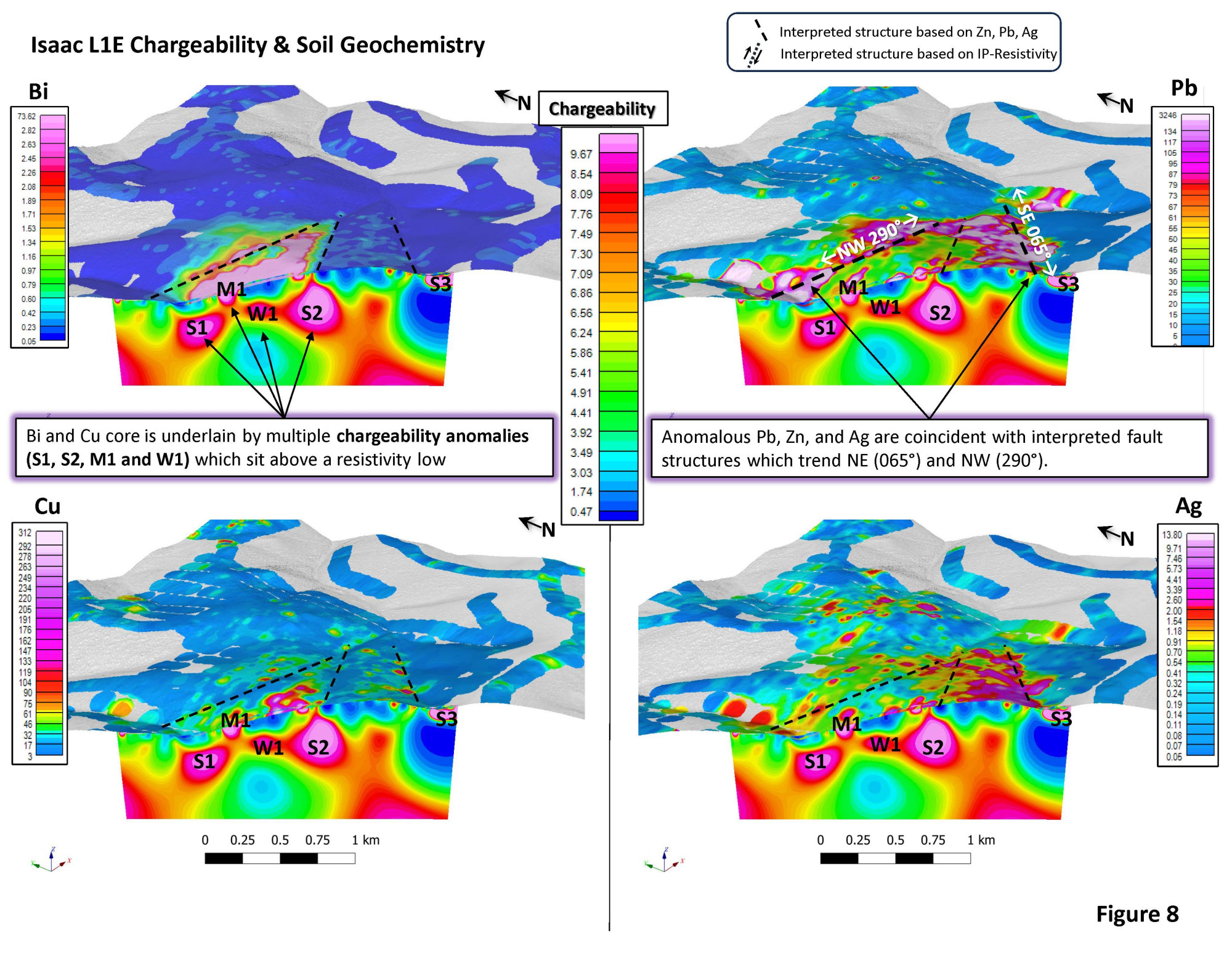White Gold Corp. Identifies Multiple Prospective IP Chargeability Anomalies on Two Large Multi-Element Porphyry Targets in Close Proximity to the Casino Copper-Gold Porphyry Deposit, Yukon, Canada
March 27, 2024
TORONTO, March 27, 2024 – White Gold Corp. (TSX.V: WGO, OTCQX: WHGOF, FRA: 29W) (the "Company") is pleased to provide an exploration update on the Bridget and Isaac porphyry targets located on the Pedlar and Hayes properties, respectively. Exploration work completed during 2023 included Induced Polarization (IP) chargeability and resistivity survey lines and hyperspectral analysis on 2022 prosecting rock samples. All data collected thus far on these large early-stage targets continue to support a porphyry deposit model.
The Pedlar and Hayes properties are situated in the southern part of the Company’s 315,000 hectare (3,150 km2) land package in the White Gold District, west-central Yukon (Figure 1). Western Copper and Gold Corporation’s (TSX: WRN, NYSE American: WRN) Casino copper-gold-molybdenum porphyry deposit (Measured & Indicated Resources of 7.6 Blb copper and 14.5 Moz gold and Inferred Resources of 3.3 Blb copper and 6.6 Moz gold) sits approximately 30 km southwest and 40 km west of the Bridget and Isaac targets respectively. Casino is one of the largest undeveloped copper-gold projects in Canada, and since 2021 has seen strategic investments by major partners including Rio Tinto Canada Inc. and Mitsubishi Materials Corporation. The Pedlar and Hayes properties are also located 40 km and 72 km southeast, respectively, of the Company’s flagship White Gold project which contains an estimated 1,152,900 ounces of gold in Indicated Resources and 942,400 ounces of gold in Inferred Resources(1).
Terry Brace, Vice President of Exploration commented: “We are encouraged by results of the 2023 IP test lines at the Bridget and Isaac targets which identified new anomalies and structures that overall correlate well with the soil geochemistry anomalies and current structural interpretations. The new IP looked deeper than any previous geophysical surveys and demonstrates potential at depth beneath these large multi-element soil anomalies. The test results warrant full IP survey coverage over the target areas which will aid in mapping these systems at depth in support of future diamond drill testing.”
Shawn Ryan, co-founder, Chief Technical Advisor and Director, commented further: “The Bridget target has an interesting history as it was one of four top prospects that was first discovered back in 1972 when Silver Standard Mines conducted an extensive 14,000 plus regional silt survey looking for another Casino. During the large regional silt survey, Silver Standard also made the Minto Copper discovery and eventually focused all their attention on that target. I staked the Bridget prospect back in 2004, and since then the property has seen extensive soil sampling programs, airborne radiometric surveys and shallow RAB drilling. The soil sampling program revealed a large copper, molybdenum and bismuth soil anomaly. The molybdenum anomaly (2 to 322 ppm) measures 4 km by 1.7 km and coincides with a very discrete bismuth anomaly (2 to 154 ppm) of 3 km by 1.4 km and a copper core anomaly (50 to 711 ppm) measuring 2.8 km by 1.3 km. A deep penetrating dipole-dipole IP survey was undertaken in summer 2023 with one line over the core of the soil anomaly and the results clearly show a textbook porphyry geophysical signature of resistivity lows and chargeability high anomalies sitting below the anomalous soils. It’s now recommended to follow up with more IP survey lines to cover this large developing porphyry target. I look forward to first diamond drill holes into this exciting target.”
An overview of the Pedlar and Hayes properties, including the Bridget and Isaac targets, was provided previously in a news release dated April 5, 2023 which is available on the Company’s website (https://whitegoldcorp.ca/news/) and on SEDAR+. Maps and images accompanying this news release can be found at http://whitegoldcorp.ca/investors/exploration-highlights/.
Highlights
- The Bridget and Isaac targets represent large, early-stage, multi-element porphyry targets that have never been diamond drill tested.
- Deep penetrating test IP survey lines conducted over existing soil geochemistry anomalies have identified a total of 13 chargeability anomalies, 5 at Bridget and 8 at Isaac.
- The Bridget soil anomaly on the Pedlar property measures 3 km NW-SE by 3.5 km NE-SW and is interpreted to represent a copper-molybdenum porphyry target. It is geochemically zoned with a molybdenum-copper-bismuth core and a silver-zinc-lead-tungsten halo.
- At Bridget, one 1st priority and four 2nd priority chargeability anomalies were identified, with target depths ranging from 40 to 330 m. The chargeability anomalies underly a large molybdenum-copper soil anomaly, and a zone of moderate to strong chargeability to the southwest appears to mark a controlling WNW (290°) striking fault which correlates with anomalous lead-zinc-arsenic in soils.
- The Isaac soil anomaly on the Hayes property is a recently discovered target which measures 2 km E-W by 1.5 km N-S, and is interpreted to represent a copper-molybdenum porphyry target. It is geochemically zoned with a bismuth-arsenic-copper core and a silver-zinc-lead halo.
- At Isaac, four 1st priority, three 2nd priority and one 3rd priority chargeability anomalies were identified, with target depths ranging from 50 to 550 m. The bismuth and copper core of the soil anomaly is underlain by multiple chargeability anomalies (S1, S2, M1 and W1 on Line 1E) which sit above a resistivity low. Anomalous lead, zinc, and silver, which form a halo around the core, are coincident with fault structures on the south side and north side of the survey area which trend NE (065°) and NW (290°) respectively.
- 2022 prospecting rock samples from both the Bridget and Isaac targets show anomalous trace element enrichments, including copper, molybdenum and silver, consistent with proximal porphyry copper-style mineralization.
- Hyperspectral analysis results for the prosecting rock samples at both Bridget and Isaac show alteration mineralogy consistent with a porphyry deposit model.
- The Company is currently planning its fully funded 2024 exploration program, focusing on its existing significant gold resources, new high grade gold discoveries and other high priority gold and multi-element targets. The Company will arrange a webinar to provide a more detailed overview of the 2023 exploration results and plans for 2024 at that time. Details to be announced in due course.
Regional Setting – The Dawson Range
The Dawson Range forms an east-southeast trending mountain range which hosts several important mineral deposits and prospects (Figure 2) including the Casino porphyry Copper-Gold deposit in the west. In the southeast near the community of Carmacks, the Minto Mine contains resources of 356 Mlb copper, 189 Koz gold, and 1.7 Moz silver in Indicated Resources and 370 Mlb copper, 207 Koz gold, and 1.9 Moz silver in Inferred Resources(5), and the Carmacks Copper project hosts 652 Mlb copper, 302 Koz gold, 3.8 Moz silver in Measured and Indicated Resources and 38 Mlb copper, 13 Koz gold, and 215 Koz silver in Inferred Resources(6) (Granite Creek Copper Ltd., TSXV: GCX, OTCQB: GCXXF), both interpreted to represent metamorphosed copper-gold-silver porphyry deposits. Porphyry deposits in the Dawson Range can be divided into 2 major ages, Late Triassic (Minto, Carmacks) and Late Cretaceous (Casino, Cash, Revenue). In addition to porphyry mineralization, epithermal, skarn, and polymetallic to gold-dominant mineralized veins, breccias and fracture zones also occur throughout the Dawson Range(7). In recent years this area has drawn increased attention and investment from both junior and major mining companies due to its high mineral potential.
2023 IP Surveys
In August 2023, Simcoe Geoscience Limited (Simcoe) carried out 7.2 line-km of time domain induced polarization (IP) chargeability and resistivity surveying at the Bridget and Isaac targets using their wireless 2D Alpha IP™ system (see About IP Survey below). At Bridget, a single 3.0 km long IP test line (line 1N) oriented NE-SW was completed using a dipole-dipole configuration. At Isaac, two IP test lines totaling 4.2 km long were oriented perpendicular to each other at NE-SW (line 4N) and NW-SE (line 1E) using a dipole-pole-dipole configuration. Both configurations can detect anomalies up to 600+ m depth.
IP Results
At Bridget, five chargeability anomalies were identified on Line 1N (Figure 3), including one 1st priority anomaly (S1) and four 2nd priority anomalies (M1-M4). Anomaly S1 has a target depth of 130 m and is characterized by strong chargeability and low resistivity. Target depths on the second priority anomalies range from 40 m (M3, M4) to a maximum of 330 m (M1). These are characterized by moderate to high chargeability and low to high resistivity.
The Bridget chargeability anomalies are plotted in relation to soil geochemistry results in Figure 4 (molybdenum, copper, lead, zinc) and Figure 5 (copper). The chargeability anomalies generally correspond with a zone of low resistivity which underlie a large molybdenum-copper soil anomaly. A zone of moderate (M1) to strong (S1) chargeability in the southwest delineates a controlling west-northwest (WNW, 290°) striking fault structure, closely correlated with lead, zinc, and arsenic soil anomalies. To the northeast, a similar WNW (295°) anomaly in lead, zinc, and arsenic defines the boundary of this chargeability anomaly and coincides with a significant tungsten anomaly, positioned along the northeastern fringe of a molybdenum anomaly. It is worth noting that in 2018 the Company drilled 10 short rotary air blast (RAB) drill holes totalling 548.6 m over the area between chargeability anomalies M2 and S1. However, these RAB holes were testing surface soil anomalies and drilled to a shallow maximum depth of only 70 m, hence the newly IP chargeability anomalies identified are completely untested.
At Isaac, 8 chargeability anomalies were identified on Lines 1E and 4N. Five anomalies occur on Line 1E (Figure 6), including three 1st priority anomalies (S1-S3), one 2nd priority anomaly (M1) and one 3rd priority anomaly (W1). The 1st priority anomalies are characterized by moderate chargeability and low to high resistivity. Target depths of the 1st priority anomalies range from 70 m (S3) to 250 m (S2). An additional three anomalies occur on Line 4N (Figure 7), including one 1st priority anomaly (S1) and two 2nd priority anomalies (M1-M2) (see Figure 7). Target depths of these chargeability anomalies range from 220 – 550 m.
The Isaac chargeability anomalies on Line 1E, oriented NW-SE, are plotted in relation to soil geochemistry results for select elements (bismuth, copper, lead, silver) in Figure 8. The bismuth anomaly appears to be controlled by faults interpreted from the IP resistivity data. The bismuth and copper core of the soil anomaly is underlain by multiple chargeability anomalies (S1, S2, M1 and W1) which sit above a resistivity low which is interpreted as a fault structure. Lead, zinc, and silver, which form a halo around the core, are coincident with fault structures on the south side and north side of the survey area which trend NE (065°) and NW (290°) respectively. Isaac is a recently recognized (2021) target and has never been drilled tested.
2023 Hyperspectral Analysis & Results
During 2023, crushed coarse rejects from 2022 prospecting rock samples from the Pedlar and Hayes properties were analyzed with an ASD TerraSpec® 4 Hi-Res Mineral Spectrometer. Results were uploaded and processed using IMDEX’s aiSIRIS™ cloud-based mineral interpretation AI software to produce semi-quantitative, standardized mineral interpretations and analytics (see About Hyperspectral Analysis below).
The Hyperspectral analysis results for the prosecting rock samples show alteration mineralogy consistent with a porphyry deposit model.
A total of 17 prospecting rock samples were collected at the Bridget target and 19 samples at the Isaac target. Samples from both the Bridget and Isaac targets show anomalous trace element enrichments, including copper, molybdenum and silver, consistent with proximal porphyry copper-style mineralization. Hyperspectral data for the Isaac target samples provide evidence for phyllic alteration characterized by muscovite and potassic alteration, with evidence of propylitic alteration found only on the southern edge of the sampled area where significant chlorite is observed. The Bridget samples show no evidence of phyllic alteration, however most samples show both geochemical and hyperspectral evidence for widespread propylitic alteration involving epidote, chlorite and albite, as well as minor potassic alteration.
Next Steps
The Company is encouraged by the success of the IP test lines in detecting chargeability and resistivity anomalies beneath the soil geochemistry anomalies at the Bridget and Isaac targets at depths from 40m to 550m below surface. These results warrant full IP survey coverage over the target areas which will aid in identifying targets at depth in support of future diamond drill testing.
About the Bridget Target
The Bridget target area is located on the Pedlar property and was first explored by Silver Standard Mines Ltd. (“Silver Standard”) and Asarco Exploration Company of Canada Ltd. (“Asarco”) in the early 1970’s following the discovery of the Casino Copper-Gold-Molybdenum porphyry deposit. A series of regional silt samples, soil sampling, and geophysical surveys by Silver Standard in 1971 and 1972 led to the discovery of a significant molybdenum-copper geochemical anomaly, now known as the Bridget target. Historical exploration work between 2004 and 2016 included soil sampling, prospecting, geological mapping, and geophysical surveys. In 2016 the Company acquired ownership of the property and has continued to expand the large multi-element (molybdenum, copper, bismuth, tungsten, lead, silver) soil geochemical anomaly that currently measures 3 km NW-SE by 4.3 km NE-SW. In 2018, a maiden rotary air blast (RAB) drilling program comprising 10 holes totalling 548.6 m was completed; however, the RAB holes were short testing to a maximum vertical depth of only 70 m, well short of potential porphyry mineralization at depth beneath the anomalous soils. Porphyry targets characterized by IP chargeability high anomalies remain completely untested.
About the Isaac Target
The Isaac target is located on the Hayes property and was first recognized by the Company as a prospective porphyry target in 2021 through soil sampling. Gridded soil sampling (50 m spaced samples on 100 m spaced survey lines) was conducted in an area located approximately 5 km south of the Yukon River where a 2017 reconnaissance soil survey identified several isolated anomalous ridge and spur soil samples. The 2021 sampling identified a new geochemically zoned multi-element soil anomaly named the Isaac target, which measures approximately 2 km east-west by 1.5 km north-south. The anomaly has a central core measuring from 750 m to 1,000 m in diameter and enriched in bismuth and arsenic, which is surrounded by a halo of anomalous silver, lead and zinc that is greater than 400 m wide. Anomalous copper occurs in the southern portion of the core, and a relatively small area of anomalous molybdenum occurs near the core’s northern margin. Geologically the soil anomaly is associated with a plug of Late Cretaceous Prospector Mountain suite, which is known to be prospective for porphyry copper-gold-molybdenum and epithermal style mineralization. The geochemical zonation and elemental distributions indicate that the anomaly may represent the surface expression of a copper-molybdenum porphyry core surrounded by distal or epithermal style silver-lead-zinc mineralization. Follow-up geological mapping and prospecting in 2022 at the Isaac target area returned anomalous copper values from the core area of the soil anomaly, with three grab samples returning from 730.6 – 1269.2 ppm Copper.
About Hyperspectral Analysis
Crushed coarse rejects from 2022 prospecting rock samples were analyzed with an ASD TerraSpec® 4 Hi-Res Mineral Spectrometer by Bureau Veritas Commodities Canada Ltd. at their preparation laboratory in Whitehorse, Yukon. Results were uploaded and processed using IMDEX’s aiSIRIS™ cloud-based mineral interpretation AI software to produce semi-quantitative, standardized mineral interpretations and analytics. TerraSpec and aiSIRIS data were reviewed and interpreted by Dr. Dennis Arne, a principal consulting geochemist with Telemark Geosciences Pty Ltd, a geological consulting services company based in Victoria, Australia.
About IP Survey
The 2023 IP surveys were completed by Simcoe Geoscience Limited (Simcoe) using their wireless time domain 2D Alpha IP™ system (https://www.simcoegeoscience.com/wireless-alpha-ip). Survey data was recorded in a Reverse & Forward array configuration with readings taken every 100 m along the line. A dipole-dipole configuration was used at the Bridget target, and a dipole-pole-dipole configuration at the Isaac target. Once the IP data satisfied the QA/QC process, the entire survey line file was exported into UBC format to run the model 2D inversions. Results were reviewed, interpreted and chargeability anomalies ranked by Simcoe’s in-house geophysicist.
About White Gold Corp.
The Company owns a portfolio of 15,876 quartz claims across 26 properties covering approximately 315,000 hectares (3,150 km2) representing over 40% of the Yukon’s emerging White Gold District. The Company’s flagship White Gold project hosts four near-surface gold deposits which collectively contain an estimated 1,152,900 ounces of gold in Indicated Resources and 942,400 ounces of gold in Inferred Resources(1). Regional exploration work has also produced several other new discoveries and prospective targets on the Company’s claim packages which border sizable gold discoveries including the Coffee project owned by Newmont Corporation with Measured and Indicated Resources of 2.1 Moz at 1.28 g/t gold and Inferred Resources of 0.2 Moz at 1.0 g/t gold(2), and Western Copper and Gold Corporation’s Casino project which has Measured and Indicated Resources of 7.6 Blb copper and 14.5 Moz gold and Inferred Resources of 3.3 Blb copper and 6.6 Moz gold(3). For more information visit www.whitegoldcorp.ca.
(1) See White Gold Corp. technical report titled “2023 Technical Report for the White Gold Project, Dawson Range, Yukon, Canada ”, Effective Date April 15, 2023, Report Date May 30, 2023, NI 43-101 Compliant Technical Report prepared by Dr. Gilles Arseneau, P.Geo., available on SEDAR+.
(2) See Newmont Corporation Form 10-K: Annual report for the year ending December 31, 2023, in the Measured, Indicated, and Inferred Resources section, dated February 29, 2024, available on EDGAR. Reserves and resources disclosed in this Form 10-K have been prepared in accordance with the Regulation S-K 1300, and do not indicate NI43-101 compliance.
(3) See Western Copper and Gold Corporation technical report titled “Casino project, Form 43-101F1 Technical Report Feasibility Study, Yukon Canada”, Effective Date June 13, 2022, Issue Date August 8, 2022, NI 43-101 Compliant Technical Report prepared by Daniel Roth, PE, P.Eng., Mike Hester, F Aus IMM, John M. Marek, P.E., Laurie M. Tahija, MMSA-QP, Carl Schulze, P.Geo., Daniel Friedman, P.Eng., Scott Weston, P.Geo., available on SEDAR+.
(5) See Minto Metals Corp. technical report titled “Form 43-101F1 Preliminary Economic Assessment Technical Report, Minto, Yukon Canada”, Effective Date March 31, 2021, Report Date May 7, 2021, prepared by Dino Pilotto, P.Eng., Tysen Hantelmann, P. Eng., Mike Levy, P.E., Sue Bird, P. Eng., Carl Schulze, P. Geo., Tad Crowie, P. Eng., Cheibany Elemine, Ph. D., P. Geo., Sam Amiralaei, P. Eng., John Kurylo, P. Eng., available on SEDAR.
(6) See Granite Creek Copper Ltd. technical report titled “Updated Mineral Resource Estimates for the Carmacks Cu-Au-Ag Project Near Carmacks, Yukon, Canada”, Effective Date February 25, 2022, Report Date April 29, 2022, prepared by Allan Armitage, Ph. D., P. Geo., available on SEDAR.
(7) Allan, M.M., Mortensen, J.K., Hart, C.J.R., Bailey, L.A., Sánchez, M.G., Ciolkiewicz, W., McKenzie, G.G. and Creaser, R.A., 2013, Magmatic and Metallogenic Framework of West-Central Yukon and Eastern Alaska: Society of Economic Geologists, Special Publication 17, pp. 111-168.
Qualified Person
Terry Brace, P.Geo. and Vice President of Exploration for the Company is a “qualified person” as defined under National Instrument 43-101 – Standards of Disclosure of Mineral Projects and has reviewed and approved the content of this news release.
Cautionary Note Regarding Forward Looking Information
This news release contains “forward-looking information” and “forward-looking statements” (collectively, “forward-looking statements”) within the meaning of the applicable Canadian securities legislation. All statements, other than statements of historical fact, are forward-looking statements and are based on expectations, estimates and projections as at the date of this news release. Any statement that involves discussions with respect to predictions, expectations, beliefs, plans, projections, objectives, assumptions, future events or performance (often but not always using phrases such as “expects”, or “does not expect”, “is expected”, “anticipates” or “does not anticipate”, “plans”, “proposed”, “budget”, “scheduled”, “forecasts”, “estimates”, “believes” or “intends” or variations of such words and phrases or stating that certain actions, events or results “may” or “could”, “would”, “might” or “will” be taken to occur or be achieved) are not statements of historical fact and may be forward-looking statements. In this news release, forward-looking statements relate, among other things, the Company’s objectives, goals and exploration activities conducted and proposed to be conducted at the Company’s properties; future growth potential of the Company, including whether any proposed exploration programs at any of the Company’s properties will be successful; exploration results; and future exploration plans and costs and financing availability.
These forward-looking statements are based on reasonable assumptions and estimates of management of the Company at the time such statements were made. Actual future results may differ materially as forward-looking statements involve known and unknown risks, uncertainties and other factors which may cause the actual results, performance or achievements of the Company to materially differ from any future results, performance or achievements expressed or implied by such forward-looking statements. Such factors, among other things, include:
The expected benefits to the Company relating to the exploration conducted and proposed to be conducted at the White Gold properties; the receipt of all applicable regulatory approvals for the Offering; failure to identify any additional mineral resources or significant mineralization; the preliminary nature of metallurgical test results; uncertainties relating to the availability and costs of financing needed in the future, including to fund any exploration programs on the Company’s properties; business integration risks; fluctuations in general macroeconomic conditions; fluctuations in securities markets; fluctuations in spot and forward prices of gold, silver, base metals or certain other commodities; fluctuations in currency markets (such as the Canadian dollar to United States dollar exchange rate); change in national and local government, legislation, taxation, controls, regulations and political or economic developments; risks and hazards associated with the business of mineral exploration, development and mining (including environmental hazards, industrial accidents, unusual or unexpected formations pressures, cave-ins and flooding); inability to obtain adequate insurance to cover risks and hazards; the presence of laws and regulations that may impose restrictions on mining and mineral exploration; employee relations; relationships with and claims by local communities and indigenous populations; availability of increasing costs associated with mining inputs and labour; the speculative nature of mineral exploration and development (including the risks of obtaining necessary licenses, permits and approvals from government authorities); the unlikelihood that properties that are explored are ultimately developed into producing mines; geological factors; actual results of current and future exploration; changes in project parameters as plans continue to be evaluated; soil sampling results being preliminary in nature and are not conclusive evidence of the likelihood of a mineral deposit; title to properties; ongoing uncertainties relating to the COVID-19 pandemic; and those factors described under the heading “Risks Factors” in the Company’s annual information form dated July 29, 2020 available on SEDAR+. Although the forward-looking statements contained in this news release are based upon what management of the Company believes, or believed at the time, to be reasonable assumptions, the Company cannot assure shareholders that actual results will be consistent with such forward-looking statements, as there may be other factors that cause results not to be as anticipated, estimated or intended. Accordingly, readers should not place undue reliance on forward-looking statements and information. There can be no assurance that forward-looking information, or the material factors or assumptions used to develop such forward-looking information, will prove to be accurate. The Company does not undertake to release publicly any revisions for updating any voluntary forward-looking statements, except as required by applicable securities law.
Neither the TSXV nor its Regulation Services Provider (as that term is defined in the policies of the TSXV) accepts responsibility for the adequacy or accuracy of this news release.
For Further Information, Please Contact:
Contact Information:
David D’Onofrio
Chief Executive Officer
White Gold Corp.
(647) 930-1880
ir@whitegoldcorp.ca
Request Meeting: https://calendly.com/meet-with-wgo/15min


